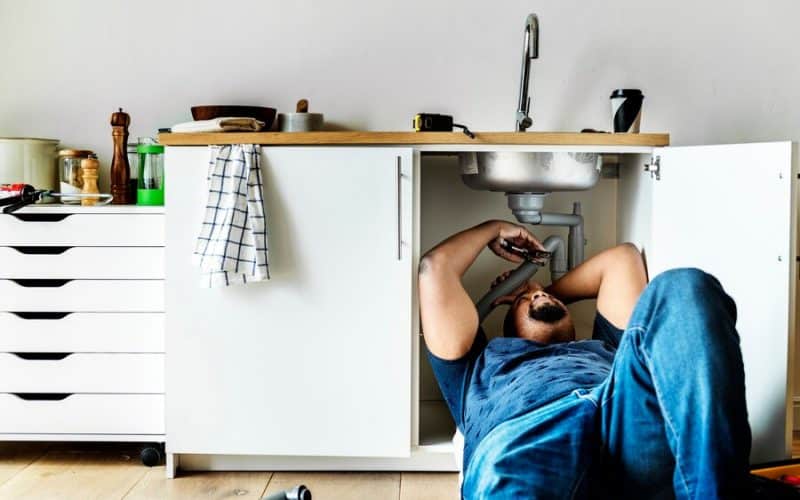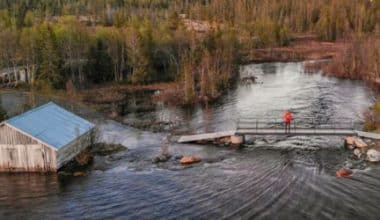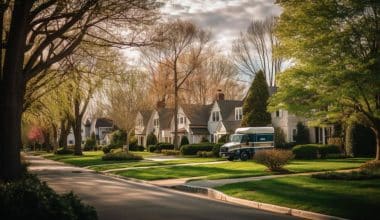Unexpected plumbing troubles may easily transform a dream home into a nightmare when it comes to owning. Burst pipes, dripping faucets, and sewer line backups can all cause significant damage and financial strain. This begs the question: Does homeowners insurance cover plumbing leaks and repairs? In this comprehensive guide, we’ll explore the ins and outs of homeowners insurance coverage for plumbing issues, providing you with the information you need to protect your home and make informed decisions.
What is Homeowners Insurance?
Homeowners insurance protects your home and personal belongings from various risks such as fire, theft, and natural disasters. It often includes coverage for your home, personal property, liability, and other living expenses. The extent of coverage for plumbing difficulties, on the other hand, may vary.
Importance of Reviewing Your Policy
It is critical to study your homeowners insurance policy before diving into the technicalities of plumbing coverage. The coverage limitations, exclusions, and endorsements of insurance policies may vary. Understanding the specifics of your policy will allow you to assess whether you have appropriate coverage for plumbing-related issues.
Does Homeowners Insurance Cover Plumbing Leaks
Plumbing leaks can cause extensive damage to your home and possessions. It is critical to understand whether your homeowners insurance covers plumbing leaks to safeguard your property and finances. In this section, we’ll go over the specifics of homeowners insurance coverage for plumbing leaks, such as what’s normally covered, exceptions and limitations, and the significance of deductibles and coverage limits.
Sudden and Accidental Water Damage
Most conventional homeowners insurance policies cover unexpected and accidental water damage caused by plumbing leaks. If a pipe breaks, a supply line leaks, or a plumbing fixture fails, causing water damage to the structure of your home or personal belongings, your insurance policy will most likely cover the following repairs and replacements.
Exceptions and Limitations
While most homeowners insurance policies cover unexpected and accidental water damage, there are several exceptions and limitations to be aware of. Leaks that occur gradually, such as those caused by wear and tear, poor maintenance, or old plumbing systems, may be excluded. Insurance companies often expect homeowners to take reasonable precautions to repair and prevent such problems with their plumbing systems.
Coverage Limits and Deductibles
It’s critical to understand your policy’s deductible and coverage restrictions when it comes to plumbing leaks. Your deductible is the amount you must pay out of pocket before your insurance coverage begins. Consider the cost of your deductible and whether it is appropriate for your financial condition. Also, be mindful of any coverage limits indicated in your insurance, since they may have an impact on the amount you can claim for plumbing-related damages.
Other Considerations: Water Backup and Flood Damage
While basic homeowners insurance normally covers plumbing leaks, it is crucial to note that water damage caused by sewer backups or floods may not be covered. These occurrences may necessitate separate insurance policies or endorsements. If you reside in a region prone to sewer backups or flooding, you should review your insurance policy and consider purchasing more coverage.
Filing a Claim for Plumbing Leaks
In the unfortunate event of a plumbing leak, it is critical to respond quickly to prevent further damage. Turn off the water supply, take photographs of the damage, and contact your insurance carrier as soon as possible to begin the claims process. For insurance purposes, provide accurate and thorough information about the occurrence, and retain records of all repair and replacement costs.
The Role of an Adjuster
An adjuster will analyze the damage and walk you through the claims procedure once you report the plumbing leak to your insurance company. They will assess the degree of the water damage, review your policy coverage, and decide the amount that can be compensated under your policy’s terms and conditions. Cooperate with the adjuster by providing any documentation or evidence required to support your claim.
Mitigating Further Damage
While you wait for the adjuster to inspect the damage, take precautions to protect your property. This may entail collecting water, drying out impacted sections, and doing temporary repairs to prevent further damage. Keep records and receipts for any expenses incurred as a result of these mitigation actions, as they may be eligible for reimbursement under the terms of your insurance.
While homeowners insurance does not often cover the cost of plumbing repairs, it is critical to evaluate your policy and look into additional endorsements or riders that can provide additional coverage for specific plumbing issues.
Does Homeowners Insurance Cover Plumbing Repair
While home insurance frequently covers damage caused by plumbing leaks, it’s crucial to note that the repair of the plumbing system itself is typically not covered. In this section, we’ll look at the scope of homeowners insurance coverage for plumbing repairs, as well as exceptions and endorsements that might help you get more coverage, and the significance of routine maintenance and neglect in insurance claims.
Plumbing Repair Coverage
In most cases, homeowner’s insurance coverage does not cover the expense of repairing or replacing the plumbing system. Plumbing repair or maintenance is often considered the duty of the homeowner. Insurance coverage typically focuses on the damage caused by unexpected and unintentional plumbing problems, rather than the repair of the plumbing system itself.
Endorsements and Exceptions
There may be exceptions or endorsements available to extend plumbing repair coverage. Some insurance providers provide extra endorsements or riders to your policy that can be added to cover specific plumbing issues or systems. Also, these endorsements may cover repairs caused by wear and tear, poor installations, or other plumbing-related issues.
Routine Maintenance and Neglect
It is vital to realize that negligence or failure to maintain your plumbing system properly may result in coverage exclusions. Insurance companies expect homeowners to take reasonable precautions to avoid plumbing problems, such as routine maintenance, inspections, and timely repairs. Your insurance coverage may be jeopardized if you do not comply.
Importance of Routine Maintenance
Regular maintenance is critical to the longevity and operation of your plumbing system. Regular inspections, responding quickly to minor leaks, and assuring appropriate maintenance of plumbing fixtures and connections can all assist in preventing significant problems and potential water damage. By investing in routine upkeep, you not only preserve your property but also demonstrate to your insurance provider that you are a responsible homeowner.
The Role of Neglect in Coverage Denial
If negligence is found to be the source of the problem, insurance companies may deny reimbursement for plumbing repairs. Neglect can be defined as failing to perform routine maintenance, ignoring warning indications of plumbing problems, or failing to take proper measures to resolve identified issues. Furthermore, to keep your insurance coverage, you must prioritize the care and upkeep of your plumbing system.
Additional Coverage Options
If you are concerned about the expense of plumbing repairs, you should look into extra coverage options. Some insurers provide service line coverage as an endorsement or as a standalone policy. This coverage can help protect you against unexpected and costly repairs to your water and sewage lines, as well as those associated with your plumbing system.
Meeting with Your Insurance Provider
It is critical to contact your insurance carrier to properly understand the coverage for plumbing repairs. They can give you information about your policy’s exact terms and conditions, exceptions, endorsements, and any additional coverage alternatives. Also, you may make informed selections about your plumbing repair coverage by discussing your concerns and needs with your insurance provider.
Steps to Take in Case of Plumbing Issues
- Immediate Water Damage Actions: If you encounter a plumbing leak, you must act quickly to prevent further damage. Turn off the water supply, remove any expensive items from the affected area, and contact a professional plumber immediately to solve the problem. For insurance purposes, document the damages and retain records of all repair and replacement costs.
- Contacting Your Insurance Company: After dealing with the immediate plumbing problem, contact your insurance company to report the occurrence and begin the claims process. Give them complete and comprehensive information about the damage, including photos, receipts, and any documents connected to repairs or replacements. Also, an adjuster will analyze the damage and advise you on the coverage options available to you.
- Working with Professionals: When dealing with plumbing issues and related damage, it is critical to work with licensed and respected professionals such as plumbers and restoration specialists. To verify coverage eligibility, observe your insurance company’s standards and check with them before hiring contractors.
- Keeping Records and Communication: Keep detailed records of every communication with your insurance company, including emails, phone calls, and claim numbers, throughout the claims process. Expenses for interim repairs or alternate accommodations should be documented since they may be reimbursed under your policy’s additional living expenses coverage.
Assessing the Need for Additional Coverage
- Evaluating Your Plumbing System: Examine the state and age of your plumbing system. Consider investing in supplementary coverage or endorsements that might give enhanced protection especially targeted to your plumbing system if your home’s plumbing is old or prone to problems.
- Optional Endorsements: Talk to your insurance carrier about optional endorsements that can cover specific plumbing difficulties. These endorsements can vary and may include coverage for tree root incursions, pipe corrosion, or other typical plumbing problems. Based on your specific plumbing system and potential risks, weigh the cost-benefit ratio of these endorsements.
- Separate Policies for Flood and Sewer Backup: Standard homeowners insurance plans often do not cover damages caused by floods or sewage backups. Also, if you live in a high-risk location, consider purchasing separate flood insurance or sewer backup policy to offer complete protection for your home and belongings.
The Importance of Preventive Measures
- Importance of Preventive Maintenance: Taking proactive efforts to maintain your plumbing system can assist in preventing problems and reducing the likelihood of water damage. Regular inspections, repairing minor leaks promptly, and ensuring proper insulation in cold times can all help to preserve the plumbing integrity of your home.
- Discounts for Safety Measures: Some insurance companies provide premium savings to homeowners who take precautions to limit the chance of plumbing issues and water damage. Upgrades to your plumbing system, the installation of leak detection equipment, or the installation of a monitored alarm system may qualify you for potential discounts. Inquire with your insurance company about any potential discounts.
While homeowners insurance generally does not cover plumbing repairs, it focuses on providing coverage for water damage resulting from sudden and accidental plumbing issues.
What does home insurance cover?
Home insurance, often known as homeowners insurance, protects you and your property in a variety of ways. While particular coverage varies based on the insurance policy and provider, the following are some of the most common categories that home insurance often covers:
- Dwelling Coverage
- Other Structures Coverage
- Personal Property Coverage
- Liability Coverage
- Additional Living Expenses
- Medical Payments Coverage
Home insurance coverage might vary depending on the policy, location, and specific endorsements or exclusions.
What are the 4 perils that insurance covers for your home?
The term “perils” refers to specific risks or events that are covered by insurance policies. While the exact policy and insurance provider may cover a variety of risks, four common perils covered by home insurance are:
- Fire and Smoke Damage
- Windstorms and Hail
- Theft and Vandalism
- Damage from Falling Objects
It is crucial to remember that coverage for these risks varies depending on the policy and any endorsements or exclusions.
Is it worth claiming on home insurance?
The type of damage or loss, the cost of repairs or replacement, your deductible, and the possible impact on your future rates all play a role in determining if it’s worth claiming on your home insurance. Here are some considerations to help you make an informed decision:
- Evaluate the Severity of the Damage
- Assess the Cost-Benefit Analysis
- Consider the Potential Impact on Premiums
- Review Your Policy’s Claim History
- Consult with Your Insurance Provider
- Consider Your Long-Term Needs
Finally, whether or not to claim your home insurance is determined by your unique circumstances and the nature of the incident. Before making a decision, it is critical to carefully assess the prospective benefits and drawbacks.
What is the most common damage to your home that insurance does not cover?
One of the most common types of damage to homes that insurance typically does not cover is flood damage. Flooding is often excluded from standard homeowners insurance policies, including damage caused by severe rain, overflowing rivers, or coastal storm surges. Flood insurance is typically purchased individually from the National Flood Insurance Program (NFIP) or commercial insurers.
Other types of damage that are commonly excluded from standard homeowners insurance policies include:
- Earthquakes
- Sinkholes
- Sewer Backup
- Routine Maintenance and Wear and Tear
- Termite or Pest Infestations
What does water damage exclusion mean?
A water damage exclusion in an insurance policy is a clause that prohibits coverage for specific types of water-related damages or losses. It states that the insurance policy will not cover water-related damages under certain events or conditions.
Does home insurance cover roots in pipes?
Damage caused by roots in pipes is often not covered by home insurance. Damage caused by tree roots penetrating and ruining plumbing or sewer lines is frequently regarded as a maintenance issue rather than a risk covered by ordinary homeowners insurance policies.
Conclusion
While home insurance normally covers sudden and accidental water damage caused by plumbing leaks, it does not typically cover the expense of plumbing repairs. It is critical to review your policy, understand your coverage limits, and investigate extra endorsements to ensure you have adequate protection for plumbing-related issues. Remember to fix plumbing leaks as soon as possible, document damages, and keep in touch with your insurance provider throughout the claims process.
By proactively maintaining your plumbing system, evaluating extra coverage alternatives, and acting quickly in the event of plumbing issues, you may help protect your property and reduce any financial obligations. Remember that each insurance policy is unique, so speak with your insurance provider to learn the intricacies of your coverage and adjust it to your requirements.
- PLUMBING INSURANCE: What Is It & Who Needs It?
- HOW TO GET INSURANCE TO PAY FOR WATER DAMAGE: Simple Steps
- Contractual Liability Insurance: Protect Your Business from Contractual Risks
- PROPERTY INSURANCE: What It Covers
- GEICO HOME INSURANCE REVIEW 2023
- HOME INSURANCE DEDUCTIBLE: What Is It & How Does It Work?






